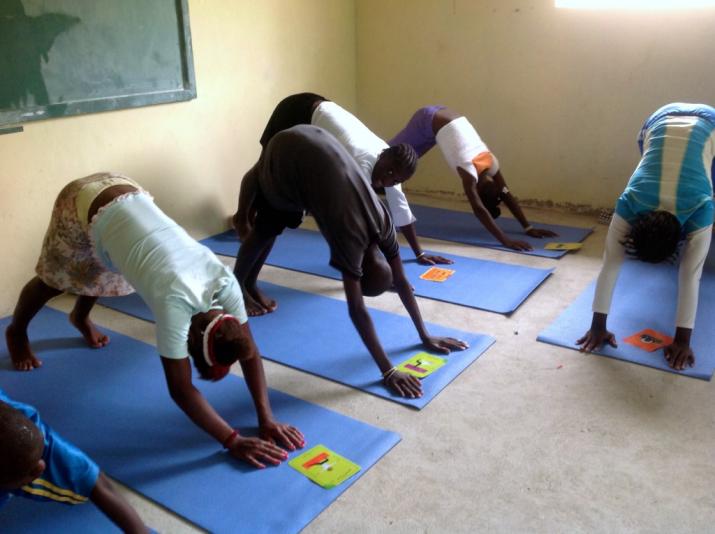
Children practicing pòz chen (downward dog pose) at CAD orphanage in Haiti
Published July 13, 2013, last updated on October 5, 2017 under Voices of DGHI
By Kathryn Culver, MSc-GH student
At the finish line of my first year of the MSc-GH program here at Duke University, I reflect in awe of how my life has changed since I began this program eleven months ago. I remember imagining... What would my ideal fieldwork project be and where would I go if I had the ability to choose? With the expertise and guidance from several faculty around Duke, I developed a one-of-a-kind fieldwork research project based on my passion for child health and human rights.
Where: two children’s homes in rural Haiti
When: June to November 2013
What: post-traumatic stress disorder among trauma-burdened youth
Who: In-country partners, Foundation for Peace (www.foundationforpeace.org) and Haitian Christian Mission (www.haitianchristianmission.org)
Why: This fieldwork research study involves three main topics related to global health: post-traumatic stress disorder, orphaned and abandoned children (OAC), and mindfulness-based alternative therapy. I chose these topics as a result of my previous experience volunteering for organizations dedicated to human trafficking, the dearth of research on alternative psychotherapies for child victims of exploitation, and the need for effective and sustainable mental health interventions in rural areas where access to mental health care is limited.
In Haiti, human trafficking is conducted in the form of the restavèk system. The term restavèk is a Haitian Creole term meaning “stay with,” implying the practice of sending a child to stay with a family perceived to be better equipped to provide education, shelter, and food for the child. However, in reality the restavèk system creates a scheme of child exploitation in which children are burdened with unpaid domestic housework and denied education. Severe stigma is associated with assigning a child the label “restavèk” since it suggests belonging to the lowest subservient caste. Consequently, restavèks are considered property and often endure traumas of physical, emotional, and sexual abuse.
Scientific research on the benefits of yoga as an alternative therapy for mental and physical health problems is steadily increasing. The revered 5000-year-old practice of yoga has been known by yoga masters and students to enhance mental and physical health through movement, meditation, and breathing techniques. A study on the application of yoga in residential treatment of traumatized youth found yoga to be a beneficial practice for youth with emotional and behavioral problems that endeavors to build connection, behavioral self-regulation, and ability in the context of structured, consistent routines.
Since many children living at the children’s homes lived through the 2010 Haiti earthquake, witnessed deaths of loved ones and were exposed to violence, many suffer from sleeping problems, emotional and behavioral difficulties, and feelings of hopelessness. Thus, an 8-week yoga program for trauma-burdened orphaned and/or abandoned children can potentially work to reduce symptoms of PTSD and improve overall health and well-being. It is hoped that yoga will reduce post-traumatic stress symptomatology among traumatized youth and translate into a greater resiliency to future traumatic stressors, improved self-regulation, and wellbeing into adulthood.


